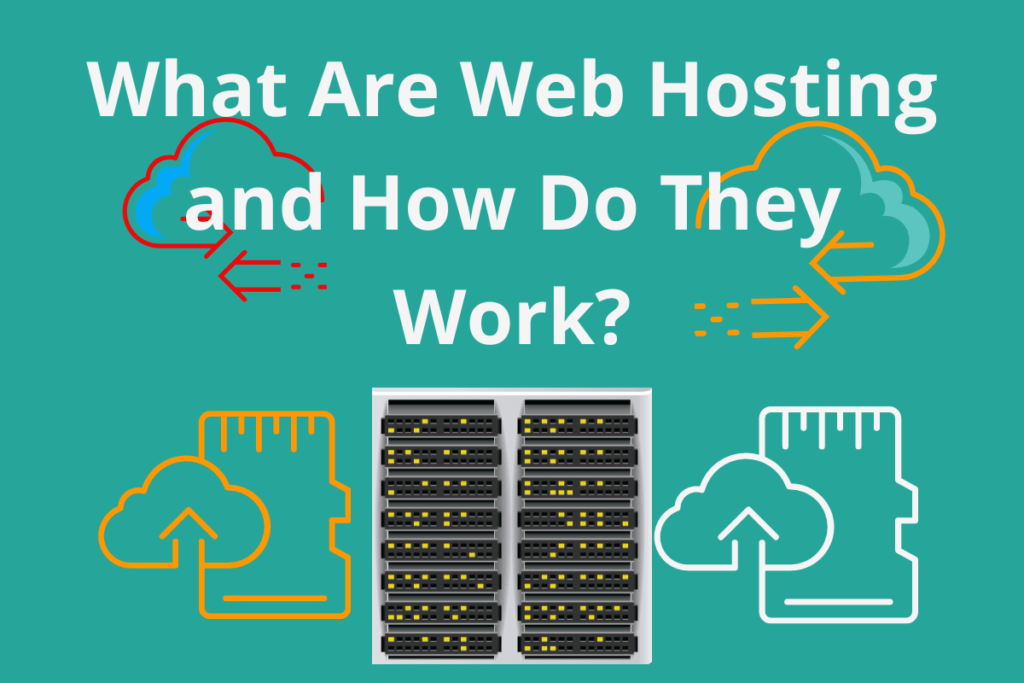The best free and paid website hosting companies briefly reviewed and compared to enable you make an appropriate decision on the one that best meets your requirements.
What are Website Hosting Services?
Website Hosting Services provide space on a web server owned by a company to host websites for their customers. These websites store files on the web server such as images, texts, plugins, codes, etc, and are available for viewing on the internet. Website Hosting Services facilitates creation, maintenance and optimal functioning of the website they are hosting. Website Hosting Services are provided by companies which are sometimes referred to as web hosts.
Types of web hosting
There are various types of web hosting, which provide services that meet the various needs of websites they host, namely;
1. Shared Web Hosting
This is when a website is being hosted on the same server and share the same server resources (CPU and RAM) and several other websites. The shared web hosting plan is relatively less expensive and can be set-up easily because all resources are shared, thereby making it a good option for beginners, or websites that are just starting up and are not expecting a high volume of traffic to their site in the short term such as blogs, personal websites and small to medium sized companies.
2. Dedicated Hosting
As your business grows and gradually becomes a large business with huge volumes of traffic to your website, you will require a dedicated hosting server in order to ensure your site performs well and is able to accommodate an appropriate number of resources.
With dedicated hosting, the server is rented exclusively by the owner of a website who will have the most control (known as complete root and admin access) over the server that stores or host their websites, including the type of operating system run by these server as well as the security of the server, which comes with a price.
In terms of cost when it comes to web hosting, the most expensive option is using dedicated servers. This type of web hosting are typically used by website owners who require total control of their server and websites with huge volume of traffic; dedicated servers require a high level of technical know-how for installing, configuring and continuous administration of the server.
3. VPS Web Hosting
VPS (Virtual private servers) hosting can be considered as a stepping stone between shared web hosting and dedicated web hosting. With VPS hosting, customers are given full access for configuring the servers but they do not have the server dedicated to their needs. The server could be serving other multiple websites; however, the website owner of a VPS hosting plan has their own space on the server, maintains full control, and may not necessarily have the technical required knowledge.
Typically, VPS hosting is used by small websites and businesses that need the flexibility of owning a dedicated server, without having to pay so much for the hosting service. Also known as VDS (virtual dedicated server), website owners are provided with additional storage space, additional customization, and personalized installations of software and packages. However, VPS hosting are not suitable for handling huge volume of traffic.
4. Cloud hosting
The latest type of web hosting that has become very popular in recent years in the technology business is cloud hosting. It works across various web servers that are interconnected, thereby providing a cheap, reliable and scalable web infrastructure, which enables the utilization of several resources as required by users without needing to build and maintain their computing infrastructure. These resources are scattered across numerous servers, which reduces the possibility of the malfunction of a server and reducing downtime.
So many businesses are turning to the cloud because cloud hosting plans provides bandwidth that is reliable and unmetered, as well as offers an unlimited amount of disk space for limitless websites. It is effective in running websites with applications that are resource-intensive or a great amount of content properties such as images, and can be quite expensive. Your website can grow as time goes on, utilising as many resources as it needs and you only pay for what you use.
5. Reseller Hosting
This involves hosting a website or selling hosting services to third parties by an account owner who has a prearranged bandwidth and hard drive space. If you are looking for a hosting plan where you could share some of the resources allocated to you with another website owner or where you don’t necessarily need a certain amount of space you purchased, then you could consider reseller hosting.
With reseller hosting you could be paying wholesale rates to the providers; and can share your CPU, bandwidth, disk space, and even choose the price for your customers. You can even consider this as an extra source of income and could make substantial profits from this type of hosting plan. It is particularly suitable for anyone who is hosting multiple sites or entrepreneurs such as web designers, agencies, web developers and those interested in this type of business.
How to choose the Best Web Hosting option for your website needs
As your business moves online, you will need a high quality, reliable, cost-effective type of web hosting service that meet your website needs and in order to run your website successfully. However, this would be different for everyone in terms of the size of your business, the resources you have, the type of website you require, the volume of traffic you are expecting to your site in the short and long terms, and ultimately your budget.
Below is a summary table of the different types of web hosting services described above to enable you narrow down your options as you read on.
Table 1: Summary Table on the different types of web hosting
| S/N | Services | Best for | Web hosting company |
| 1 | Shared Web Hosting | Cost-effective. Entry-level websites. Small self-hosted websites. Hobby bloggers. Small business websites. | Pros Affordable. Technical knowledge not required. Out-of-the-box. Preconfigured Server environment. Managed server administration and maintenance. Cons Only certain programming languages and environments supported. Only pay more when you exceed a certain Bandwidth limit/traffic threshold. Limited storage space. Expensive upgrades. Traffic surges can impact website availability. |
| 2 | Dedicated Web Hosting | Enterprise-level servers. Large websites. High traffic websites. Web applications processing sensitive customer data. eCommerce websites. | Pros Non-constrained configuration/customization. Full-access control over hosting server. Guaranteed availability of resources. Improved security and privacy. Stable and predictable website performance. Cons Expensive type of web hosting plan. Requires technical resources for management. Requires regular maintenance and upkeep. |
| 3 | VPS Hosting | Media-heavy websites. Small to medium-sized business websites. | Pros Dedicated server space. Scalability and stability. Root access to server. Install any software of your choice. More cost-efficient than a dedicated server. Cons Software patches and security are your responsibility Server performance tuning and “housekeeping” tasks are your responsibility. Requires technical knowledge for installation/management. Configuration and control limitations |
| 4 | Cloud Hosting | Web applications. eCommerce websites. Rapid-growth websites. | Pros Limited downtime. On-demand access to resources. Lower latency. Pay-per-use pricing. Scalability. Access to value-added services. Resources pooling. Cons Limited customization. Shared security responsibilities. Cloud expertise required. Sub-optimal resource usage could result in higher costs. |
| 5 | Reseller Hosting | For entrepreneurs interested in the web hosting business, for multiple websites | Pros Lower cost and expenses. Business Focus. Room for expansion. Income opportunities. Brand Building. Additional Features. Cons Requires technical knowledge. Requires a lot of time. |
Tips for Choosing a Web Host
Choosing the best web hosting company that met your individual or business needs can be very challenging, and knowing the key things or important criteria to consider would help you significantly. Below are a few things, among many, to consider when choosing a web host.
1. Availability or Uptime
When it comes to availability, you are looking for a web host that can guarantee that your website will be available online without any downtime due to maintenance work or failing for a long time due to issues with their servers. You will be looking for a web host that has a good track record within the industry of an uptime or availability at least above 99.95%
2. Scalability
For an entity that has a low volume of traffic to their website or if they are just starting out, it may be suitable to choose a shared web hosting plan because this type of hosting plan is best for new websites and /or blogs, and will be enough to run your website. As you site grows and the volume of traffic to your website increases, you may then consider moving or upgrading your site to other hosting plans that are suitable according to your needs such as cloud hosting and dedicated hosting. This is considered as scalability; ensuring your web host offers scalable options with additional features if and when you need them.
3. Security
Cybersecurity is an important issue when it comes to choosing a web hosting service, and the choice you make regarding a web host can determine the security of your site. When it comes to the security of your website, you need to ensure your web host has a good track record and have the facilities/protocols in place to protect your website against all forms of cyber threats/attacks. Also, your web host should be able to protect your website against distributed denial-of-service (DDoS) attacks as well as be able to apply other security measures such as protection against malware, intrusion detection, firewall, encryption and monitoring. Your web host should also be able tyo provide a back up service to enable you restore your site easily when it goes offline or if there is an issue as well as comply with any regulations around where your website is primarily operating from/in such as data protection regulations.
4. Constant availability of technical support
It is quite daunting to manage a website, particularly when it gets too technical and you are not sure what to do when there is an issue that requires a technical expert such as your web host to look into. It is important to have a web host that is always available to provide you with the required technical support when you need it. You do not want a situation whereby if your website goes offline, you may have to wait until the next day or couple of days to be able to get assistance in fixing it.
5. Bandwidth and traffic
This is the amount of data transferred from your server to browsers of visitors to your website. You the website owner would be using up bandwidth each time one of the pages on your website is loaded by site visitors using a mobile phone, tablet or computer, and you may be using significant amount of bandwidth if your site runs heavy contents such as videos, images or music. So, it is important to be aware that there is a limit on the amount of bandwidth you can actually use when you sign up to some hosting packages, and that if these limits are exceeded each month, you may be incurring additional charges.
6. Cost
Cost is an important factor to consider when choosing a web host. Compare the various pricing options offered by the web hosting providers and ensure thee are no hidden extra cost associated with the services you are signing up for, including as it relates to renewals, upgrades and bandwidth.
7. Storage
Although storage may unlikely be an issue if you are just starting out or have a small website, several web hosting packages comes with quite a substantial amount of storage. However be mindful that even though thee is a substantial amount of storage or unlimited amount of storage, you may not be allowed to store materials that are unrelated to your site. You may want to consider other storage options for these types of files/materials.
8. Location
The location of the data centres are important when choosing a web host. The location is also equally important if you collect any personal data on your website. You may be allowed by some web hosting services to choose the location of your data centre, which could greatly improve the performance and speed of your website.
Content delivery network (CDN) are also included in some hosting packages which creates cached copies of your website and stores these on servers all over the world, and will help website owners with global audience.
Conclusion
From reading this article, you should now have a much clearer picture of what you need to look for when choosing a web host. You should understand that there are quite a few technical considerations you need to think about as well as looking at the service and support offered by the host.
One of the things you should do is look at the reviews that the web host is receiving to give you a clear indication of what the current customers of the web hosts think of their service. Nevertheless, after you have a tangible knowledge of the fundamentals of web hosting, you may want to reflect on the most appealing type of web hosting service that would meet your needs: shared, dedicated, VPS, cloud or otherwise. It will also be helpful to create a short checklist of important features to enable you narrow down your search for easy decision making.



